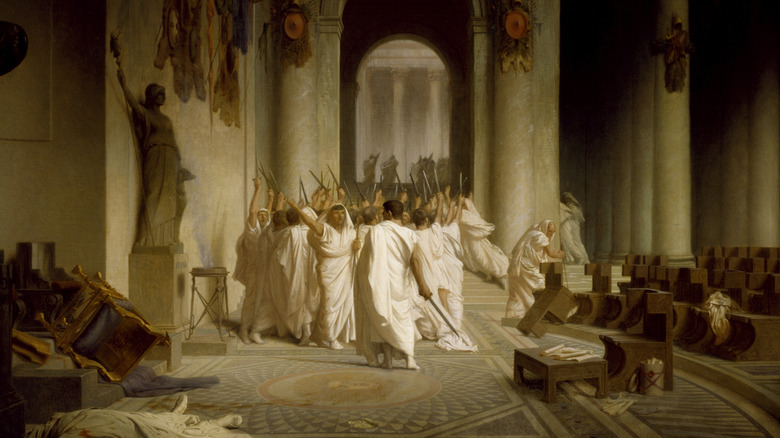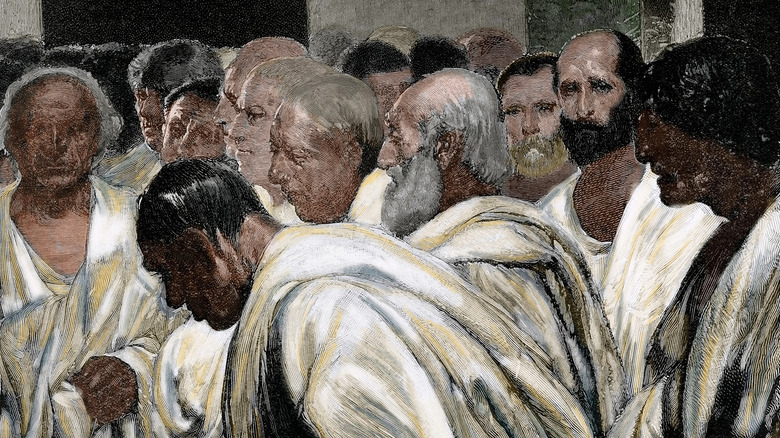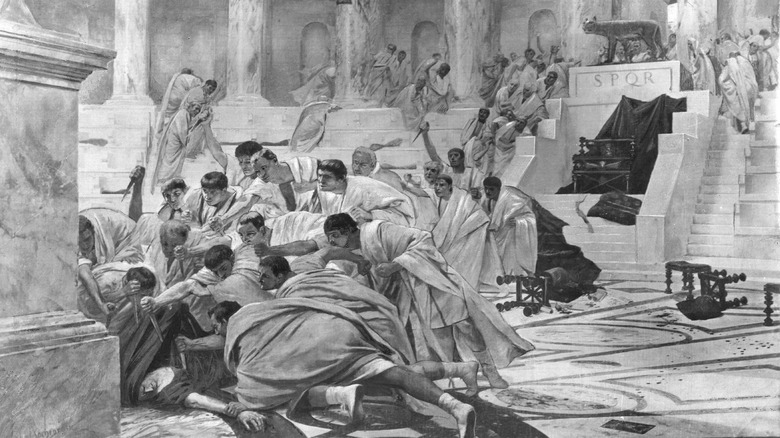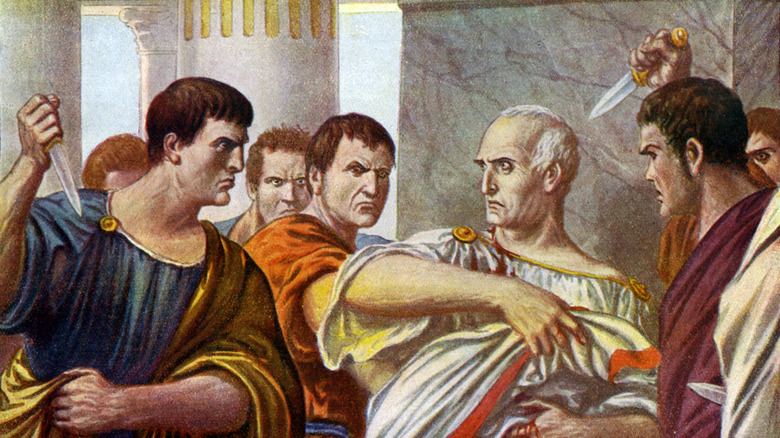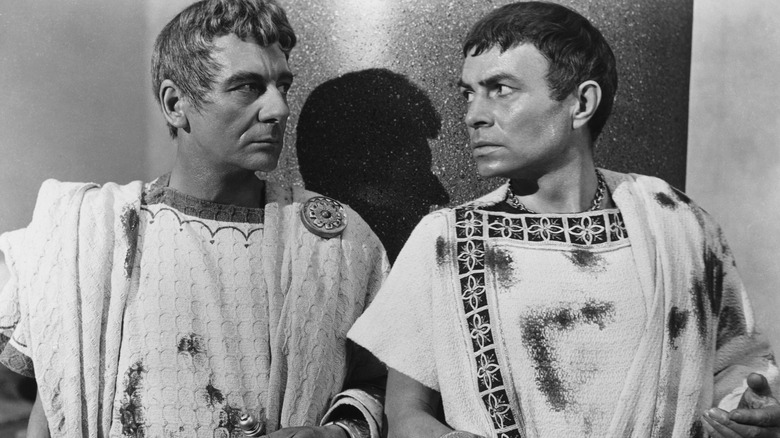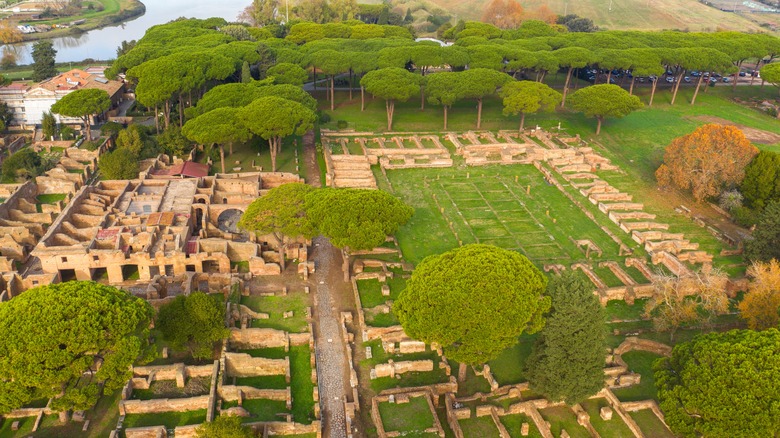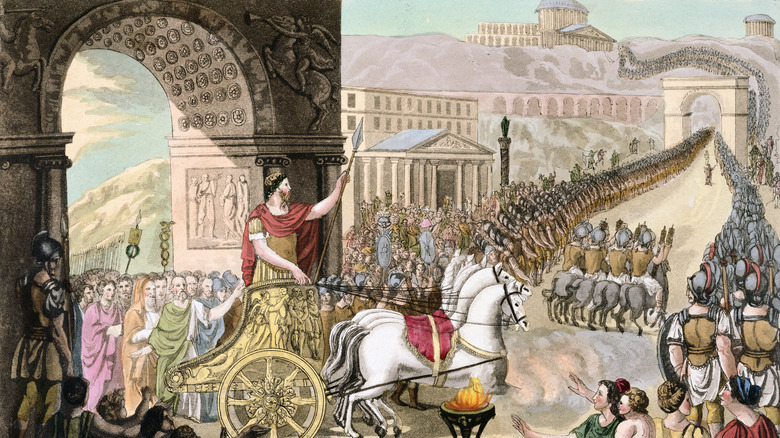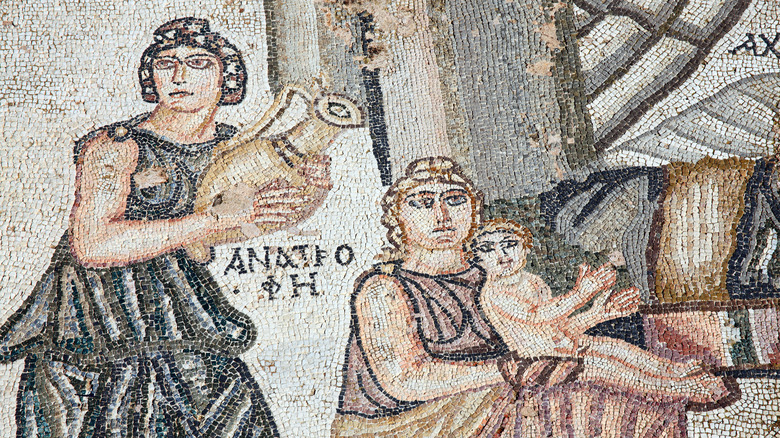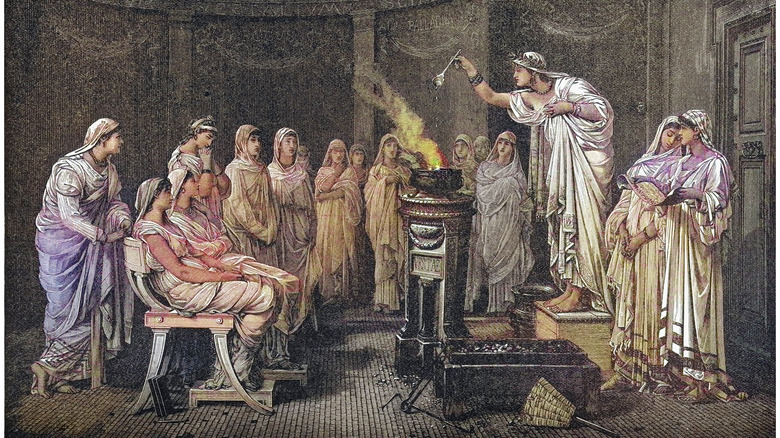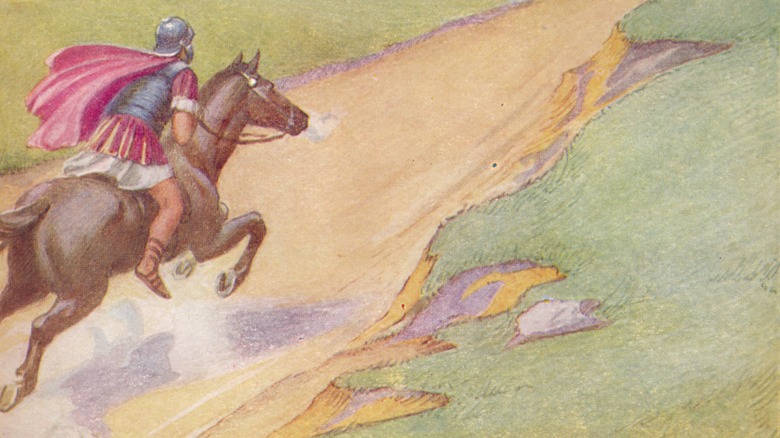What It Was Like The Day Julius Caesar Died
For many people of ancient Rome, the morning of March 15, 44 B.C., was just midpoint of the month, commonly referred to as the ides. At one point, the ides of March was the very beginning of the year, though that start point was moved to the first of January by 153 B.C. Even so, the Roman calendar became a confusing mess that needed constant readjustment, until someone strong-armed it into shape. That would be Julius Caesar, who not only reset it as the Julian calendar in 46 B.C., but set off on a campaign to reboot the whole of Rome.
Caesar was a highly successful general turned politician who had become famous for conquering the territory of Gaul, touching off a civil war (which he won), and establishing himself as an increasingly powerful dictator. But he had also made some powerful enemies. That morning would see the culmination of a long-simmering assassination plot, as a group of about 40 senators had decided that they'd had enough of the power-hungry Caesar. Surrounding him as he entered the Curia of Pompey for a Senate meeting, the group including onetime allies Marcus Junius Brutus, Gaius Cassius Longinus, and Decimus Junius Brutus Albinus, among others, stabbed Caesar to death. A rudimentary autopsy of Caesar concluded he died of blood loss.
The brutal and sudden end to Rome's leader would kick off a long series of extraordinary events, but the day itself would prove to be plenty dramatic in a city that was already on edge.
If you were a politician, you were probably worried
As Roman politicians awoke that morning, at least a few surely had a bad feeling in their gut when they thought about Julius Caesar. He had proven to be a troublesome presence in the Roman political machine and was increasingly willing to step over convention to get things done the way he saw fit. That way often granted him increasing power with every step. He didn't always consult the Senate when making decisions, decided that he had the power to reject the results of some elections, and happily courted the favor of soldiers by promising them land and power. By early 44 B.C., he had even been granted the now-ominous in retrospect title of dictator for life.
While some were beginning to resist Caesar's increasingly obvious attempts to secure absolute power, others were busy welcoming their new overlord. Some had engaged in a campaign of flattery, with historian Suetonius (admittedly born over a century after Caesar's death) writing that Caesar accepted lifetime political appointments, headed up public censorship campaigns, and indulged in fanciful thrones, a custom statue, and a month renamed for him. Some even deified the man and laid the groundwork for a religious cult in his honor, complete with a temple. Many began to fear that Caesar was in pursuit of power at all costs — including the cost of a truly republican Rome. And given how dysfunctional government broke the republic, they were right to be worried.
Caesar probably felt pretty confident
In Act 1, Scene 2 of Shakespeare's "Julius Caesar," a soothsayer repeatedly warns Caesar to "Beware the ides of March." But Caesar waves off the warning and strides on to his doom. In the same work, his wife Calpurnia also joins the group warning him of pending death, but to little effect.
However, on the day of his assassination, did the real Caesar really think that he was about to be killed? Probably not. After all, he did show up to the Senate session that day and, critically, did so without any bodyguards or other attendants to look out for him. (Only senators were allowed into sessions.) Reportedly, he was only going in to reschedule the session, though whether he was really worried about an attack, was feeling ill, or had some other reason remains unclear. Whatever happened, the conspirator Decimus reportedly convinced him to attend the meeting anyway.
Of course, Caesar was likely well aware that some senators were unhappy with his steadily accumulating glory and power. Perhaps, after he had curried favor with many other senators and appointed a few key officials, he had assumed they would rush to his aid if any trouble arose. But, given how the group of assassins quickly separated and surrounded Caesar and then rushed upon him with daggers, it could be that Caesar had grown too comfortable in his power. This may well represent one of the leader's few but crucial tactical mistakes.
Conspirators executed a carefully planned and rapid assassination
Though the actual assassination was short work with plenty of disturbing details, it was the result of much planning and long-simmering tensions. The leader was a once-close associate of Caesar named Decimus, though tradition has long singled out Brutus and Cassius as the ringleaders. Decimus and the rest of the group were apparently seriously concerned about Caesar's accumulating power and the threat he represented to the traditional republican mode of government. They may have also had more personal motivations; Decimus was surely slighted when Caesar didn't allow him to celebrate a military victory with a big parade, as he'd done for other commanders. Maybe they were also upset when they were passed over for promotions, with Caesar's great-nephew Octavian taking over key roles in the government (and indeed Octavian would take over as the Emperor Augustus after his great-uncle's death).
But, for all the political machinations, jockeying for power, potentially hurt feelings, and precise planning, the assassination itself was brutal. When Caesar entered Pompey's Senate House, the group of conspirators quickly surrounded him, cutting off any immediate access to help. They then fell upon him with daggers. (The shorter weapons were easier to sneak into the Senate and wield in close quarters.) The daggers were also common military weapons, which Brutus later used as symbols of their honorable intentions. And though Caesar reportedly got a few of his own strikes in with a stylus he used for writing, it was soon over.
Caesar's true final words were lost to history
When it comes to dramatic deaths throughout history, we're often fascinated by the last words that come out of someone's mouth, be they bold or cowardly, illuminating or mundane. But what was the nature of Caesar's final speech that bloody morning? It's up for debate.
The phrase that's most likely coming to mind right now — "Et tu, Brute?" or "You too, Brutus?" — is almost certainly made up. No ancient sources record this phrase, which instead pops into the cultural consciousness quite a few centuries later in the Renaissance. It most famously rings out in Shakespeare's "Julius Caesar," which premiered in London in 1599. Other sources say that Caesar may have said something along the lines of "You too, child?" when he saw Brutus amongst the group, referencing their close relationship (or, as more salacious rumors had it, Caesar's possible fathering of Brutus with a mistress). Or it could have been "You, too," as a sort of curse or wish that the leader was spitting toward his traitorous assassins.
But the truth is that much of the above is little better than rumor or outright fabrication. While shocked or resigned exclamations of betrayal sound pretty good on stage, we can't take these as authentic eyewitness accounts of Caesar's final words. In fact, given how quickly the killing occurred and that Caesar had practically no warning of what was to happen, it's more likely that he said nothing at all.
The assassins were surprised by the immediate reaction to the killing
Whether or not they also harbored personal motivations, Julius Caesar's group of assassins expected to be hailed as heroes for taking down a power-hungry dictator and restoring freedom and liberty to the republic of Rome. Brutus had even planned to give a speech in the immediate aftermath of the killing that outlined how Rome was finally going to be okay again with the autocratic figure of Caesar out of the way.
But, while the group of men may have carefully planned the assassination, they apparently didn't think quite so carefully about the aftermath. Right away, Brutus and company found that they were at the center of a massive controversy. While they had obviously turned against Caesar, his populist moves (especially when it came to tax cuts and debt adjustments) made him a favorite of lower-class Romans. Upper-class types weren't exactly happy either, as that morning kicked off an agonizing competition for power that saw Caesar's great-nephew Octavian take the throne (briefly alongside Mark Antony) and become Augustus, the first emperor of Rome. As the authoritarian regime of Augustus dramatically changed Rome (which admittedly included bringing in a period of peace and wealth), Caesar's legacy continued despite his sudden death.
That day saw the beginnings of immediate unrest, however. A series of speeches from figures on both sides eventually inflamed the people to riot, and the assassination kicked off years of unrest before Augustus truly seized power.
Many city dwellers lived in crowded tenements
While the dramatic killing of Julius Caesar was taking place at the Senate building known as the Curia of Pompey, regular people across the city of Rome almost certainly had no idea what was going on. Many would surely have been preoccupied with making a living in the bustling urban area, where economic stresses and class divisions could make survival a difficult task.
For much of Rome's ancient history, city dwellers lived in seriously cramped quarters. While especially high-class citizens might live in separate homes or even expensive villas, it was more likely that someone woke that morning in one of the many cramped tenements known as insulae. A century or so before Caesar met his death, there were already an estimated 46,000 of these apartment buildings in Rome — and they were hardly luxury dwellings. With practically no fire suppression systems or strict building codes, not to mention narrow streets and poor sanitation, living in these buildings was not just uncomfortable but potentially deadly. Collapses, fires, illness, and other hazards routinely threatened the lives of regular Romans living inside insulae. And with high crime rates in the city, it could be that the news of yet another stabbing took a moment to grab a stressed Roman's attention.
Social hierarchy would have shaped everyone's day
Even in a single apartment block, the social hierarchy of Rome was obvious and affected day-to-day life. Those who were better off and relatively higher-ranking lived on the lower floors of a tenement, where an annual rent payment could secure a spacious multi-room dwelling that might even have access to a sewer system. On the upper floors, residents were more likely to be scrounging up money for weekly or even daily rent payments on a one-room dwelling. Even higher up in the ranking were those who lived in their own home, referred to as a domus.
By 44 B.C., legislation had codified many social differences. Sumptuary laws starting in 215 B.C. dictated the sorts of clothing people could wear, entertainments they could arrange, and even the kind of food they ate — though it's not as if the dirt-poor residents of an apartment's top level were putting on many fancy dinner parties. On that morning, the togas of the upper classes sometimes sported increasingly broad purple stripes as its wearer moved up in rank. Caesar himself was fond of donning a regal and supremely expensive full-purple toga (later worn by emperors only).
But, while the social order was all-important, by the day of Caesar's death, some had been able to buck the system. Occasionally, some lower-ranking people were able to gain powerful and moneyed patrons who could make life significantly easier through social connections, money, legal assistance, and more.
Most women were still expected to hold the home together
Even when word of the assassination reached everyone, people still had to be clothed, prepare food, and raise children — and much of that day-to-day domestic labor fell to women. For the average Roman woman in the city, life was dictated in one way or another by men in their family. Daughters would even be named based on their father's name, meaning a man named Claudius would have a daughter named Claudia. More than one daughter? No problem; just add a suffix, meaning Claudius could produce a Claudia Major, Claudia Minor, and even a Claudia Tertia if the female children began to stack up.
Some high-ranking women would have wielded prestige and influence through a male relative's status or their own religious standing (such as being chosen to be a Vestal virgin). However, misogynistic attitudes of the day generally held that women were weaker and should be confined to the home, where they were praised for weaving cloth, having children, and keeping their mouths shut. And women generally had to be married, as there were few places for older singles outside of religious life. For most women that day, it was another home-bound schedule, even if Caesar had just been assassinated.
Still, it wasn't as bad as in other societies. By 80 B.C., women were regularly dining alongside men — considered shocking by conservative Greek visitors — and could manage goods and property with the rubber-stamp approval of a guardian.
Religious worship had to go on
According to ancient Roman belief, the gods had to be worshiped daily. Just as important was ensuring that these deities were honored in precisely the right way. Anything less, and both the Roman state and the basic social unit of the family could crumble. So, the gods were propitiated in individual temples, by priests and priestesses, and with plenty of offerings. Most Romans saw their relationship with the gods like a business transaction, with a human offering up something (prayers, promises, offerings) in exchange for assistance. Some actions were considered absolutely vital; part of life as a Vestal virgin meant keeping the symbolic hearth fire of Rome perpetually burning, lest disaster befall society.
Romans also believed that the gods would occasionally communicate via omens. The Greek writer Plutarch wrote that a seer tried to warn Caesar about his looming doom and that it would happen on the ides of March. Meanwhile, Suetonius goes so far as to say that the diviner's name was Spurinna. In either story, Caesar enters the Senate building and smugly tells the soothsayer that nothing happened. Not yet, says Spurinna shortly before the murder.
Even if the story is pure fiction, it illustrates widely held Roman attitudes about the gods, who demanded attention and respect. That morning in 44 B.C., families were almost certainly paying tribute to the gods at home, while religious officials were doing the same on a larger scale.
News wouldn't reach beyond Rome for a little while
Though word of Julius Caesar's assassination would have quickly spread through the densely populated city of Rome, it would have taken a while for it to reach people in more rural settlements. In a time without telecommunications equipment or motorized transport, getting the news out would have been a relatively slow process. For farmers and similar other folks making a living out in the sticks, the morning of Caesar's death would have probably seemed like the beginning of any other humdrum day.
Still, it was only a matter of time before the news reached all corners of the Roman world. Compared to many other ancient societies, Rome had seriously advanced communications and transportation systems like a network of roads, not to mention other ancient Roman inventions that would go on to change everything. Caesar's successor, Augustus, would even go on to create a more formalized system of communication between government officials known as the cursus publicus. This came to include a series of couriers to move messages through the empire as quickly as possible. Though this system obviously wasn't in place at the time of Caesar's death, there were already long-established roads throughout Roman territory that would have allowed travelers to breathlessly relate the dramatic killing in the capital.
